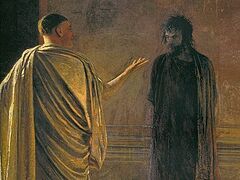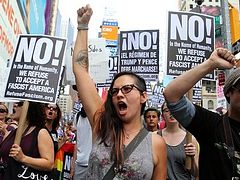But God has chosen the foolish things of the world to put to shame the wise, and God has chosen the weak things of the world to put to shame the things which are mighty; and the base things of the world and the things which are despised God has chosen, and the things which are not, to bring to nothing the things that are… (1 Corinthians 1:27-28)
Mary sang: He has shown strength with his arm, he has scattered the proud in the imagination of their hearts, he has put down the mighty from their thrones, and exalted those of low degree; he has filled the hungry with good things, and the rich he has sent empty away. (Luke 1:51-53)
In the New Testament, it is clear, even if surprising, that when God became incarnate, God did not choose to enter the world as a billionaire, an emperor, a supreme commander, or even as an American. Similarly, when God chose Israel to be His people – God didn’t choose the richest or most powerful nation on earth to be His people. [As God told Israel: It was not because you were more in number than any other people that the LORD set his love upon you and chose you, for you were the fewest of all peoples; but it is because the LORD loves you, and is keeping the oath which he swore to your fathers, that the LORD has brought you out with a mighty hand, and redeemed you from the house of bondage, from the hand of Pharaoh king of Egypt (Deuteronomy 7:7-8).] God’s ways are not our ways. In the Nativity account of Christ’s birth, it is very apparent that the Lord, God and Savior Jesus Christ is born into poverty, not power. In fact it is the King, Herod, who attempts to murder the infant Jesus; Jesus and His parents have to flee for their lives. God chooses to exalt the poor, not the powerful. That is one reason Christianity is Good News to the poor. And yet, many American Christians continue to prioritize and strive for wealth and power, ignoring the Gospel.
In the hymn known as The Magnificat, the Virgin Mary overcome by the Holy Spirit sings about God throwing the mighty off their thrones and instead exalting the lowly. God does not enter the world as rich and powerful. So it should give us Christians pause when we hunger for power and wealth. It is not God’s choice or way.
In America, Christians lust to keep power in the nation, yet the Theotokos reminds us that God sends the rich away empty handed and raises up the poor and lowly. American Evangelicals in recent years especially have lusted to maintain power in the nation, but God has shown through history that He is not always on the side of the mighty, even of kings or presidents who considered themselves to be Christian. But power and wealth are often too tempting to people of faith who even begin to believe the sign of God’s favor is that we have power and wealth. Christ, who disavowed worldly wealth and power, would disagree with our assessment of them. Orthodox theologian Paul Evdokimov reflects on political power and Christians.
In history, ‘Christian’ empires and states, like the theocracies, have crumbled under the pressure of a world which pure and simple refused submission to ecclesiastical authorities. Every good that violates and forces consciences becomes evil and is, in Berdiaev‘s words, ‘the nightmare of good by compulsion’ in which human freedom, willed by God at the price of his death, is abused. This is why domination of the world, its submission to the power of the Church, is directly opposed to the central message of the Gospel to those ‘captive to the Kingdom of God,’ to the authentic Christian force which ‘tears apart the heavens.’ (IN THE WORLD, OF THE CHURCH, p 200)
What Christ taught us is to be the salt of the earth and light to the world (Matthew 5:13-14), not its kings or kingmakers nor its powerbrokers or premiers. We have a relationship to the world but to be its leaven (Luke 13:21: the Kingdom of Heaven is like leaven), not to force the people of the world to submit to Christ or even to make the world into the church. We should remind ourselves that monasticism grew not as a reaction against secularism, but as a reaction against the Christian empire and imperial religion with all its power and wealth. Evdokimov continues by referencing several Roman Catholics who he feels share an Orthodox spirit about power:
Karl Jaspers explains in a penetrating analysis: ‘The idea of authority comes to us from Roman thought. Auctor is the one who sustains a thing and develops it, the one who gives growth. Auctoritas according to etymology is the force which seeks to sustain and give growth,’ which keeps watch not in defense but in belief. It is apparent that it has nothing to do with making someone obey but to make one flourish, bloom.
Lafay is precise: ‘Authority differs from power. The one inspires the sentiment of respect and veneration, the other fear. Authority has to do with dignity, power with force.’ But it is Father Laberthonniere who goes the furthest: ‘Authority which subordinates itself to those submissive to it and which links its situation to theirs, achieves with them a exquisite communion and this is liberating.’ In this case, authority is the guardian of freedom, her guarantee. As Bishop Dupanloup says: ‘All authority whose principle is not that of self-sacrifice is not worthy of this great name.’ Such self-sacrifice the scriptures call diakonia (IN THE WORLD, OF THE CHURCH, p 224-225)
Christian power is aimed at transforming our hearts, not of creating a military power to dominate or threaten the world. Jesus showed no interest in being that kind of worldly king, for His kingdom is not of this world – it’s values are heavenly and divine not earthly and profane. Christian power and authority is designed to increase love and help all people blossom into all that God intends for us. Christian power doesn’t dominate over people, but rather subordinates itself to those it serves. It is a diakonia, a service of others, like Christ becoming a servant to wash the feet of His disciples (John 13:1-17).
In our election year, we still are not looking to gain power or control others, rather we are looking for a nation in which we are free to serve others – to love them, forgive them, minister to them and to be cheerful givers.
As Shane Claiborne and Chris Haw write about the United States in JESUS FOR PRESIDENT: “We are seeing more and more that the church has fallen in love with the state and that this love affair is killing the church’s imagination. The powerful benefits and temptations of running the world’s largest superpower have bent the church’s identity. Having power at its fingertips, the church often finds ‘guiding the course of history’ a more alluring goal than following the crucified Christ. Too often the patriotic values of pride and strength triumph over the spiritual virtues of humility, gentleness, and sacrificial love.” (p 17)




